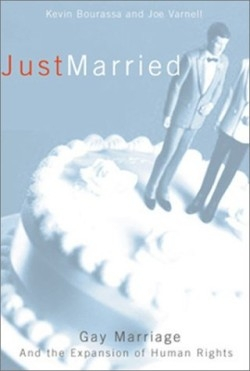Just Married
Gay Marriage and the Expansion of Human Rights
“The evening dashed recklessly forward, and around me the room filled with snippets of conversation and the fireworks of laughter,” says author Varnell. This excitement could only be expected, since he and Bourassa had become the first legally married same-sex couple in North America, if not the entire world. The reception in their home in Toronto, Ontario, attended by friends and family, including their parents, was the culmination of many weeks of fighting for their right to marry.
A little-used law in Canada made it possible for the two men to marry. If “reading the banns” in a recognized church goes without a legal challenge for three successive weeks, the province of Ontario is obliged to grant any couple a legal marriage license. Which the Province did. Their fight was over, but the larger political battle had just begun. The government of Canada refused to recognize this license, thus breaking its own law. This case is expected to go all the way to the Canadian Supreme Court.
The court action, however, does not negate the fact that two same-sex couples (one male, one female) found a way to become legally married in the Metropolitan Community Church. Varnell and Bourassa write about being in the eye of the churning media storm surrounding this case for many weeks. Told alternately from each of their points of view, the story provides a mostly warm, sometimes frightening, and often eye-opening look at Canadians and their institutions.
Why the two couples chose to go through the intense publicity and do battle with religious and governmental institutions is explained succinctly in a section titled “The Burning Platform.” Varnell and Bourassa came to a point “where keeping things the same” was “more painful than making a change.” Living with each other in a loving relationship without the legal protections afforded heterosexual couples was no longer acceptable.
This autobiographical account of this most intriguing case is appropriate reading for gay people, political historians, and anyone interested in the ongoing push for the expansion of human rights.
Disclosure: This article is not an endorsement, but a review. The publisher of this book provided free copies of the book to have their book reviewed by a professional reviewer. No fee was paid by the publisher for this review. Foreword Reviews only recommends books that we love. Foreword Magazine, Inc. is disclosing this in accordance with the Federal Trade Commission’s 16 CFR, Part 255.

